As the Anaheim Ducks approach Thanksgiving, the informal end of the NHL regular season, according to many NHL experts, their defensive corps is a glaring weakness. Injuries have emphasized this weakness, but the Ducks have another more difficult issue to solve that is holding them back, the lack of a pure sniper. That might seem obvious. Any team can use a goal-scoring specialist, after all, you have to score to win games, but the Ducks very desperately need one. They have shown an ability to generate excellent scoring opportunities that they can’t finish.
Gritty or Pretty, Goals Still Aren’t Easy to Come By
Last season, the Ducks notoriously weak offense stood out as one of the many issues that saw them finish near the bottom of the league. This season, things feel a little different. The change in style from Randy Carlyle’s uninspired dump-and-chase system to head coach Dallas Eakins’ possession-focused philosophy has done wonders for the excitement of Anaheim fans.
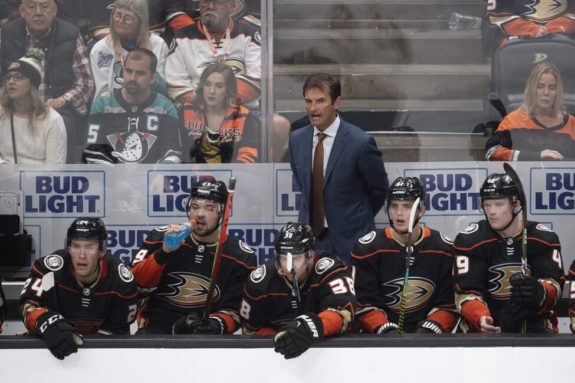
Still, the Ducks are losing games and quickly falling out of the playoff picture in the Western Conference. As of Sunday, Anaheim sat tied for No. 25 in the league in goals for per game at 2.71 with division foe the Arizona Coyotes.
They are ranked No. 21 in the league in shots for with 722. Those two numbers match pretty well, so why does it feel like the Ducks are more competitive in games that they are losing by three goals? While it does have a lot to do with five-on-five versus special teams play, it has more to do with a vital skill set that the Ducks lack – finishing ability.
Lots of Fancy Stats, Few Fancy Players
Even though the Ducks are still lurking near the bottom of the league in the stat that counts – goals scored – they are generating better opportunities. Even though they are only No. 21 in shots and No. 20 in team shooting percentage, the Ducks are the sixth-highest ranked team in “High-Danger chances for” with 279 in all situations.
The High-Danger chances for stat keeps track of scoring chances and gives them a value according to where in the offensive zone they occur in relation to the goal and what type of shot it is. For example, a slapshot from the blue line would be assigned a lower value than a rebound directly in front of the opponent’s goal. If that value reaches a certain level, it is considered a “high-danger scoring chance.” They are the most likely to result in a goal.
The Ducks rank No. 14 in high-danger goals for which are, you guessed it, goals scored from those attempts with 33.
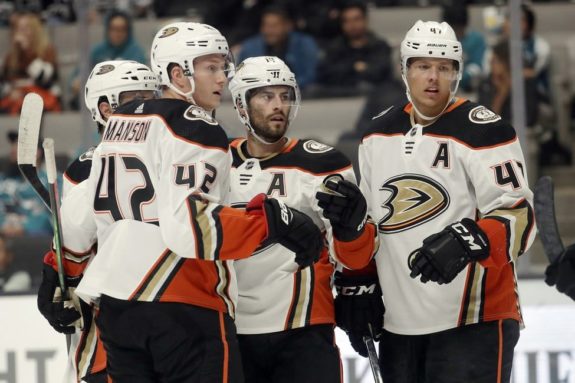
Combining those stats with the relatively low number of shots the Ducks accumulate in games, their poor power play performances, and the general feeling that the Ducks are in games that they are losing by more than a goal and you see the problem. They don’t have a pure-bred goal-scoring assassin.
More Power Play Punch
You don’t even need a fancy stat like high-danger scoring chances if you actually watch the games. The Ducks seem always to be squandering prime rebounds in front of the net, shooting the puck into the goalie’s chest protector or fumbling one-timer opportunities on the power play.
Fox Sports West color analyst Brian Hayward points it out it almost once every game when Anaheim has a man-advantage. A Ducks player will receive a pass at the “Ovie” position — named for Washington Capital Alexander Ovechkin due to his legendary ability to score from near the top of the faceoff circle on one-timers — and instead of one-timing the puck, they will cradle it and try a wrist or snapshot giving the goalie time to get into position to make the save.
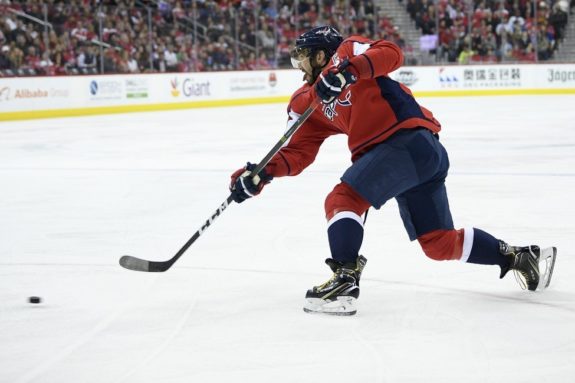
It’s not that Ducks players don’t know one-timers are more effective in that position. It’s that they don’t seem to have the ability to unleash a hard, accurate one-timer with regularity.
A goal-scoring specialist positioned at the “Ovie” spot who can one-time even a mediocre pass would do wonders for the Ducks’ power play.
Ducks Lack Efficiency
With a weak defensive group, offensive efficiency is vital, and the Ducks don’t have it.
A sniper can help with more than just the power play. When your team doesn’t generate a lot of shots, players have to make the best of their opportunities. The fact that no Ducks player seems to be able to bury those prime chances with more consistency is what has caused the gap between the number of prime scoring chances the Ducks create and the number of goals they score.
A “sniper” can regularly convert chances near the opponents’ goal, and they can make something out of nothing. Like Phil Kessel in his heyday or Brad Marchand now, true goal scoring specialists have you wondering how the puck found the back of the net so quickly when it seemed unlikely at best.
How Do the Ducks Get One?
If you’re thinking, “The Ducks do have goal scorers, Rickard Rakell has had back to back 30-plus goal seasons in his career, and Jakob Silfverberg is on pace for 30 this season,” you’re not thinking big enough.
Those players do have the ability to provide an elite level of offense, but at this point in their careers, they are what they are, talented top-six forwards. They aren’t certified goal-scoring studs.
The real answer is they don’t, at least not for a while. The quickest potential solution for this issue is Trevor Zegras. The Ducks No. 9 overall pick from the 2019 draft is in his first, and maybe only college season at Boston University.
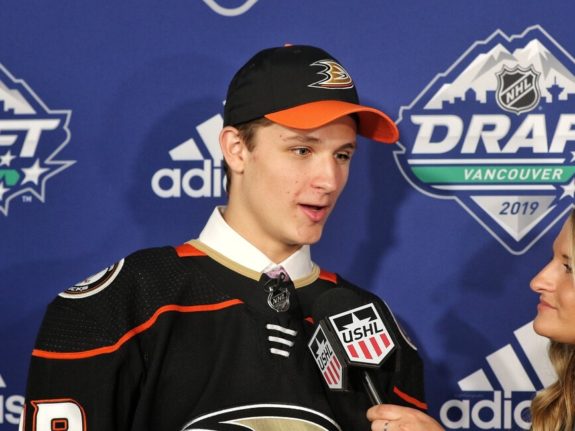
Scouting reports say Zegras is an excellent playmaker who prefers to pass first rather than shoot, although he is reputed to have a strong shot as well. If Zegras is willing to take on even a slightly more selfish style of play that sees him shoot more often, maybe he’s the guy when he reaches the NHL. But it is too early to tell. Zegras is at minimum four or five months away from making his NHL debut if he does go pro after the college season.
Hall, Hoffman and Free Agency
Free agency is an option, but there are two limitations to that. The first is that general manager Bob Murray has never shown an inclination to sign a high-priced, high-scoring free agent. There were no rumblings of any interest from the Ducks in Artemi Panarin or Matt Duchene this offseason.
There are only two players that could meet the “goal scorer” label in the potential 2020 unrestricted free agent class. They are 2018 Hart Trophy winner Taylor Hall and Florida Panther Mike Hoffman. Surprisingly, Hall has only ever had one 30-plus goal season, as has Hoffman, who just turned 30 years old.
Even if the Ducks make sense as a free agent or even trade destination for Hall, the odds Murray spends the assets needed to acquire him are low considering Murray’s history.
Additionally, while the Ducks aren’t a “budget team,” in that they typically spend to the league’s salary cap, they rarely offer free agents the signing bonus-loaded contracts that are all the rage these days – especially with their most talented players.
Signing Bonus Bonanza
For example, while many teams probably had the resources to offer John Tavares an $11 million contract, few could’ve done that providing much of it in a signing bonus as the Toronto Maple Leafs did. Approximately $71 million of Tavares’ $77 million contract are to be paid in signing bonuses.
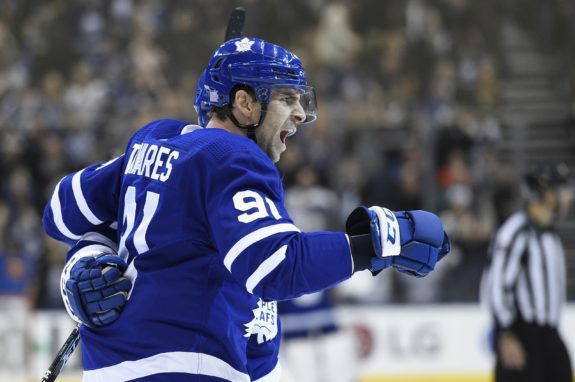
TSN’s Travis Yost described this problem well in a 2018 article. A contract heavy on signing bonuses makes it almost impossible for a team to buy out a player later in their contract, helping ensure that they will earn the total value of their contract. It can also have tax advantages and ensures that a player will still receive a paycheck during a potential lockout.
The problem is, not all teams can afford to or are willing to pay that much money in signing bonuses, and the Ducks are one of them. From 2017 to 2019, the Ducks ranked No. 20 in the league in signing bonuses paid out with $5,625,000. Nearly half of that went to Corey Perry, a player the Ducks drafted and developed who was arguably the Ducks last pure “goal scorer.”
Taylor Hall Trade
That leaves a trade. Though many want the Ducks to trade for Hall, the New Jersey Devils would command a high price for him. Not to mention, he is a free agent after the season, meaning he will likely be looking for a contract heavy on those signing bonuses. The Ducks would be at a high risk to trade assets for him and then lose him in free agency.
Hall is also sure to be looking for a significant raise to his $6 million contract, whether he deserves it or not. Don’t count on the Ducks trading for Hall, don’t even hope for it like I’m hoping for a Ferrari under my Christmas tree.
No, unless one of the Ducks youngsters suddenly develops into an elite sniper, which, even though they may become good NHL players, isn’t looking that promising.
The Ducks offense is desperately in need of a player that can convert their abundance of dangerous scoring chances and make something out of nothing. Unfortunately, short of Santa delivering Teemu Selanne 2.0 under the Ducks tree, that isn’t going to happen anytime soon.